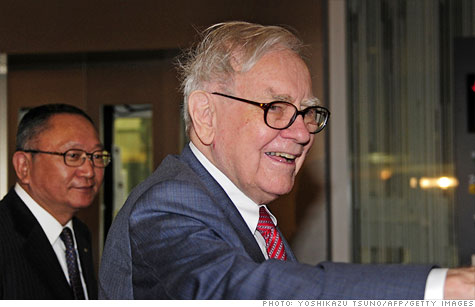Search News

Warren Buffett, like other super-rich, gets a big chunk of his income from investments -- and benefits from preferential tax rates as a result.
NEW YORK (CNNMoney) -- How would millionaire and billionaire investors like Warren Buffett fare under the GOP presidential hopefuls' tax plans?
Here's a good bet: Much better than Buffett would like.
The chairman of Berkshire Hathaway (BRKA, Fortune 500), of course, has famously called for higher taxes on the super-rich. Last year, he paid only 17.4% of his nearly $40 million in taxable income in federal income taxes -- a much lower rate, he said, than his secretary.
One big reason why: Investment income makes up a large portion of Buffett's total income, as it does for many of the wealthiest taxpayers. And the 15% tax rate on long-term capital gains and dividends is well below the 35% top income tax rate on ordinary income.
How much the wealthy should pay in taxes is always a hot-button issue, but particularly so in an age of record deficits.
The Republican candidates are pushing to lower taxes across the board, including for the wealthy, arguing such a move would spur investment and economic growth.
President Obama is also pushing for lower taxes on most Americans, except on the wealthy. In September, he proposed the "Buffett Rule," a guideline to ensure that millionaires pay a higher percentage of their income in federal taxes than those who make less.
For his part, Buffett has kept a low public profile in the GOP presidential race, and he did not respond to a request for comment on the candidates' plans.
But if most of those seeking the Republican nomination have anything to say about it, Buffett would be taxed less on his investments, not more.
Rick Santorum would reduce the capital gains rate to 12% from 15% for everyone.
Jon Huntsman, Newt Gingrich, Ron Paul and Rick Perry would exempt long-term capital gains from taxation. A few of them would also treat dividends and interest as tax-free.
As for Mitt Romney, he would eliminate the capital gains and dividend tax on adjusted gross income up to $200,000 for a couple, $100,000 for singles.
So a rich couple could enjoy tax-free investment income on up to $200,000 if all of their money came from investments, according to the Tax Policy Center, which has analyzed several of the GOP candidates' plans.
Or, to take another example, if the couple made $100,000 in salary or other non-investment income, they would still pay 0% on up to $100,000 of their investment income.
Now, it's likely that Buffett's total non-investment income tops $200,000, so he wouldn't benefit from that provision.
But he would be spared an increase in the capital gains rate, since Romney would preserve the current investment tax rate of 15%, rather than let it increase as scheduled next year to 20% for long-term capital gains and to the ordinary income tax rate for dividends.
Buffett and other wealthy shareholders also would potentially prosper under the GOP hopefuls' plans to lower the corporate tax rate. That's because relative to most Americans, a large share of their income comes from investments in corporations. And generally speaking, a lower corporate rate could boost shareholders' after-tax return.
Gingrich would like to lower the corporate tax rate to 12.5%; Paul to 15%; Santorum to 17.5% (although 0% for manufacturers); Perry to 20%; and Huntsman and Romney to 25%.
Economists argue that a lower corporate rate could also benefit workers by way of higher wages and consumers by way of lower prices.
"However, it would not change the basic conclusion that cutting corporate taxes disproportionately benefits high-income taxpayers," said Roberton Williams, a senior fellow at the Tax Policy Center.
The wealthy may also dodge a tax bullet under the Republican candidates' plans since they all would repeal the new health reform law. That law calls for a new 3.8% Medicare tax on investment income starting in 2013. Currently investment income is exempt. ![]()
| Overnight Avg Rate | Latest | Change | Last Week |
|---|---|---|---|
| 30 yr fixed | 3.80% | 3.88% | |
| 15 yr fixed | 3.20% | 3.23% | |
| 5/1 ARM | 3.84% | 3.88% | |
| 30 yr refi | 3.82% | 3.93% | |
| 15 yr refi | 3.20% | 3.23% |
Today's featured rates:
| Latest Report | Next Update |
|---|---|
| Home prices | Aug 28 |
| Consumer confidence | Aug 28 |
| GDP | Aug 29 |
| Manufacturing (ISM) | Sept 4 |
| Jobs | Sept 7 |
| Inflation (CPI) | Sept 14 |
| Retail sales | Sept 14 |